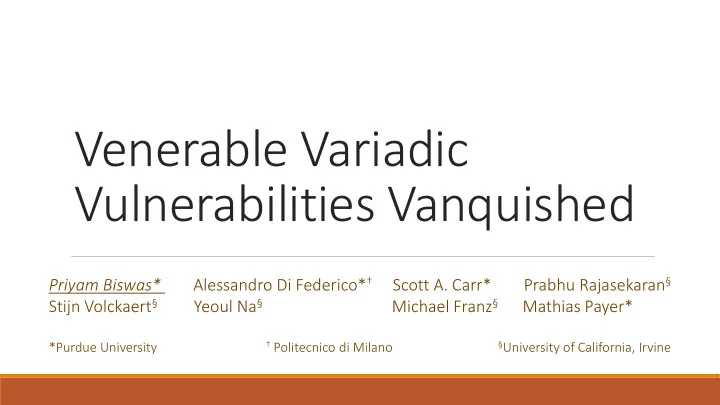

Venerable Variadic Vulnerabilities Vanquished Alessandro Di Federico* † Scott A. Carr* Prabhu Rajasekaran § Priyam Biswas* Stijn Volckaert § Yeoul Na § Michael Franz § Mathias Payer* *Purdue University † Politecnico di Milano § University of California, Irvine
int add(int n, ...) Variadic Function { va_list list; va_start(list, n); C and C++ support variadic functions for ( int i=0; i < n; i++) total=total + va_arg(list, int ); Variable number of arguments va_end(list); return total; Implicit contract between caller and callee } int main( int argc, const char * argv[]) Cannot statically check the argument types { result = add(3, val1, val2, val3); result = add(2, val1, val2); return 0; } 2
Motivation Parameters of variadic functions cannot be statically checked Attacks violate the implicit contract between caller and callee Attacks cause disparity: more/less arguments or wrong argument type Existing defenses do not prevent such attacks 3
Prevalence of Variadic Functions Program Call Sites Functions Prototype Total Indirect Total Address Taken Firefox 30,225 1,664 421 18 241 Chromium 83,792 1,728 794 44 396 FreeBSD 189,908 7,508 1,368 197 367 Apache 7,121 0 94 29 41 CPython 4,183 0 382 0 38 Nginx 1,085 0 26 0 14 OpenSSL 4,072 1 23 0 15 Wireshark 37,717 0 469 1 110 4
Threat Model Program contains arbitrary memory corruption Existing defense mechanisms such as DEP, ASLR, CFI are deployed Capabilities of the attacker Directly overwriting the arguments of a variadic function Hijacking indirect calls and call variadic functions over control-flow edges 5
Control Flow Integrity (CFI) Verifies indirect control flow transfers based on statically determined set Allows all targets with the same prototype Attacker controlled callsite int*(int) int foo (int n, …) int baz (int n, …) Legal variadic Illegal variadic int bar(int n, …) function target function target int boo (n) void func (int n, …) Void func2(int n, …) Legal Illegal Legal Illegal args. args. args. args. 6
Intended Actual target LLVM-CFI 1 pi-CFI 2 CCFI 3 VTV 4 CFG 5 HexVASAN target Variadic Calls: Current CFI Mechanisms Prototype Addr. Taken Variadic Same Yes X X X X X No X X X X Different Yes X X X No X X X Non- Same Yes X X X Variadic No X X X Different Yes X X X No X X Original Overwritten Arguments X X X X X 1. Enforcing Forward-Edge Control-Flow Integrity in GCC & LLVM , USENIX Security 2014 2. Per-Input Control-Flow Integrity, CCS 2015 3. CCFI: Cryptographically Enforced Control Flow Integrity, CCS 2015 4. GCC 6.2 Virtual Table Verification 5. Microsoft Corporation: Control Flow Guard (Windows) 7
Our Approach Enforce contract between caller and callee Verify argument types at runtime Abort if there is an error 8
HexVASAN Design callee caller check_arg (0, int) void foo ( …) { int a, b; x = va_arg(int); read foo(a, b); OK ….. Verification ? record MetaData z = va_arg(char*); Storage } arg. count = 2 arg[0].type = int check_arg (1, char*) arg[1].type = int 9
Implementation Implemented as LLVM pass Statically instrument code Dynamically verify types of variadic arguments (library) 10
Real Code Is Hard! Handling multiple va_list HexVASAN supports it by recording each va_list separately Floating-point arguments Handles floating point and non-floating point arguments separately Handling aggregate data types Caller unpacks the fields if arguments fit into registers Traces back to get the correct data type 11
Evaluation Comparison with state-of-the-art CFI mechanisms Usage of variadic functions in existing software Performance overhead in SPEC CPU2006 benchmark & Firefox 12
Exploit Detection Format string vulnerability in “ sudo ” Error: Type Mismatch CVE-2012-0809 Index is 1 Callee Type: 43 (32-bit integer) Attacker can escalate the privileges Caller Type: 15 (Pointer) Backtrace: [0] 0x4019ff <_vasan_backtrace+0x1f> at test Not detected by -Wformat [1] 0x401837 <_vasan_check_arg+0x187> at test [2] 0x8011b3afa <__vfprintf+0x20fa> at libc.so.7 [3] 0x8011b1816 <vfprintf_l+0x86> at libc.so.7 HexVASAN detects exploit [4] 0x801200e50 <printf+0xc0> at libc.so.7 [5] 0x4024ae <main+0x3e> at test [6] 0x4012ff <_start+0x17f> at test 13
Performance Overhead: SPEC CPU2006 1.2 0.6 0 Native HexVASAN 14
Interesting Cases: Spec CPU2006 Omnetpp Caller : NULL Callee : char* Perlbench Caller : Subtraction of two char pointers (64 bit) Callee : int ( 32 bit) 15
Performance Overhead: Firefox Benchmark Native HexVASAN Octane AVERAGE 33,824.40 33717.40 STDDEV 74.96 125.89 OVERHEAD 0.32% JetStream AVERAGE 194.86 193.68 STDDEV 1.30 0.58 OVERHEAD 0.61% Kraken AVERAGE 885.52 887.12 STDDEV 11.02 7.31 OVERHEAD 0.18% 16
Sample Findings: Firefox Case 1 Caller : unsigned long Callee : unsigned int Case 2 Caller : Bool Callee : unsigned long Case 3 Caller : void* Callee : unsigned long 17
Conclusion HexVASAN successfully monitors variadic arguments Detects bugs due to type mismatch in variadic functions Negligible overhead in SPEC CPU2006 and Firefox Open Source at https://github.com/HexHive/HexVASAN 18
Thank you! Questions? Open Source at https://github.com/HexHive/HexVASAN 19
int add(int n, ...) int add(int n, ...) { { va_list list; va_list list; va_start(list, n); va_start(list, n); for ( int i=0; i < n; i++) list_init(&list); total=total + va_arg(list, int ); for ( int i=0; i < n; i++) { check_arg(&list, typeid(int)); va_end(list); total=total + va_arg(list, int );} return total; va_end(list); } list_free(&list); return total; int main( int argc, const char * argv[]) } { int main( int argc, const char * argv[]) result = add(3, val1, val2, val3); { return 0; precall(vcsd); } result = add(3, val1, val2, val3); postcall(vcsd); return 0; } 20
Recommend
More recommend